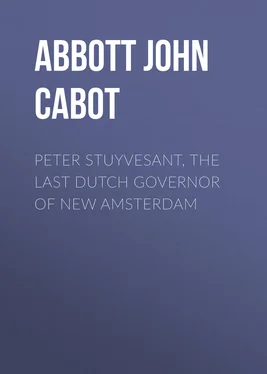John Abbott - Peter Stuyvesant, the Last Dutch Governor of New Amsterdam
Здесь есть возможность читать онлайн «John Abbott - Peter Stuyvesant, the Last Dutch Governor of New Amsterdam» — ознакомительный отрывок электронной книги совершенно бесплатно, а после прочтения отрывка купить полную версию. В некоторых случаях можно слушать аудио, скачать через торрент в формате fb2 и присутствует краткое содержание. Жанр: foreign_prose, История, foreign_edu, foreign_antique, на английском языке. Описание произведения, (предисловие) а так же отзывы посетителей доступны на портале библиотеки ЛибКат.
- Название:Peter Stuyvesant, the Last Dutch Governor of New Amsterdam
- Автор:
- Жанр:
- Год:неизвестен
- ISBN:нет данных
- Рейтинг книги:3 / 5. Голосов: 1
-
Избранное:Добавить в избранное
- Отзывы:
-
Ваша оценка:
- 60
- 1
- 2
- 3
- 4
- 5
Peter Stuyvesant, the Last Dutch Governor of New Amsterdam: краткое содержание, описание и аннотация
Предлагаем к чтению аннотацию, описание, краткое содержание или предисловие (зависит от того, что написал сам автор книги «Peter Stuyvesant, the Last Dutch Governor of New Amsterdam»). Если вы не нашли необходимую информацию о книге — напишите в комментариях, мы постараемся отыскать её.
Peter Stuyvesant, the Last Dutch Governor of New Amsterdam — читать онлайн ознакомительный отрывок
Ниже представлен текст книги, разбитый по страницам. Система сохранения места последней прочитанной страницы, позволяет с удобством читать онлайн бесплатно книгу «Peter Stuyvesant, the Last Dutch Governor of New Amsterdam», без необходимости каждый раз заново искать на чём Вы остановились. Поставьте закладку, и сможете в любой момент перейти на страницу, на которой закончили чтение.
Интервал:
Закладка:
It is very evident that Sir Henry Hudson was by no means a good disciplinarian. The authority he exercised over his crew, was very feeble. A mutinous spirit began already to prevail, and we are told that they threatened him savagely. It would appear that Sir Henry and his mate wished to repair to Newfoundland, and after having passed the winter, which was close upon them, there to resume their voyage, in search of a northwest passage, through Davis's Straits. But the turbulent crew would not consent. They compelled the captain to turn the prow of his ship towards Europe. After the voyage of a month the Half Moon cast anchor in the harbor of Dartmouth, England, on the 9th of November, 1609.
It will be remembered that Sir Henry Hudson was an Englishman, though he was sailing in the service of the Dutch East India Company. When the Dutch Directors heard of his arrival in England, and of the important discoveries he had made, they sent orders for him immediately to repair to Amsterdam. At the same time the Dutch government claimed, by the right of discovery, all that portion of the North American continent along whose coasts Hudson had sailed and upon whose shores he had occasionally landed, taking possession of the same in the name of the Dutch government.
The English government, jealous of the advantage which had thus been gained by the flag of Holland, peremptorily forbade Hudson to leave his native country; and for several months the Half Moon was detained at Dartmouth.
CHAPTER II.
THE PROGRESS OF DISCOVERY
Value of the Territory Discovered.—Fate of Hudson.—The Conspiracy.—Aspect of Manhattan Island.—The Trail which has Widened into Broadway.—The Opening Commerce.—The Fur Trade.—Visit of the English Man of War.—Exploring the Sound.—Commercial Enterprise Receives a New Stimulus.—Erection of Forts.—Character of the Fur Trade.
The Half Moon was detained in England eight months, and did not reach Amsterdam until the summer of 1610. The Dutch Directors, though disappointed in not finding in the region they had explored the much hoped-for Northwest Passage to the Indies, were somewhat elated by the magnificent discoveries which had been made. The territory they claimed, by virtue of these discoveries, extended from the mouth of the Delaware on the South, to Cape Cod on the Northeast. The grand river of Canada, the St. Lawrence, was deemed its northern frontier. Its western boundaries were unexplored and unknown.
This was indeed a princely territory to be owned by any power. The climate was as favorable as any to be found upon the globe. The soil was fertile, the landscape being picturesquely diversified by mountains and valleys. Vast forests, of the most valuable timber, covered immense portions. Wild fruits and nuts in great variety were found in profusion. The territory was watered by several truly magnificent rivers. The region was filled with game; and furs, of the richest kind and apparently in exhaustless quantities, could be purchased of the natives, at an almost nominal price.
It may be worthy of notice, that Sir Henry Hudson never revisited the pleasant region which he had discovered, and which he had pronounced to be 'as beautiful a land as the foot of man can tread upon.' In the summer of 1610, Hudson entered the service of a London company and sailed from the Thames in the "Discovery," in search of either a Northwest or Northeast passage to the Indies. Passing Iceland, appropriately so called, he gazed with astonishment upon Hecla in full eruption, throwing its fiery flood and molten stones into the air. Doubling the Cape of Greenland, he entered Davis's Straits. Through these he passed into the gloomy waters beyond.
After spending a dismal winter, in the endurance of great privation, exposed to severe Arctic storms, his mutinous crew abandoned him, in the midst of fields of ice, to perish miserably. The following artless account of this tragedy, which is taken from the lips of one of the mutineers, will be read with interest. The ship was surrounded with ice and the crew in a starving condition.
"They had been detained at anchor in the ice," says Pricket,
"about a week, when the first signs of the mutiny appeared. Green, and Wilson the boatswain, came in the night to me, as I was lying in my berth very lame and told me that they and several of the crew had resolved to seize Hudson and set him adrift in the boat, with all on board who were disabled by sickness; that there were but a few days' provisions left; that the master appeared entirely irresolute, which way to go; that for themselves they had eaten nothing for three days. Their only hope therefore was in taking command of the ship, and escaping from these regions as quickly as possible.
"I remonstrated with them in the most earnest manner, entreating them to abandon such a wicked intention. But all I could say had no effect. It was decided that the plot should be put into execution at daylight. In the meantime Green went into Hudson's cabin to keep him company, and to prevent his suspicions from being excited. They had determined to put the carpenter and John King into the boat with Hudson and the sick, having some grudge against them for their attachment to the master. King and the carpenter had slept on deck this night, but about daybreak, King was observed to go down into the hold with the cook, who was going for water. Some of the mutineers ran and shut down the hatch over them, while Green and another engaged the attention of the carpenter, so that he did not observe what was going on.
"Hudson now came from the cabin and was immediately seized by Thomas and Bennet, the cook, who had come up from the hold, while Wilson ran behind and bound his arms. He asked them what they meant, and they told him that he would know when he was in the shallop. Hudson called upon the carpenter to help him, telling him that he was bound. But he could render him no assistance being surrounded by mutineers. The boat was now hauled along side, and the sick and lame were called up from their berths. I crawled upon the deck as well as I could and Hudson, seeing me, called to me to come to the hatchway and speak to him.
"I entreated the men, on my knees, for the love of God, to remember their duty. But they only told me to go back to my berth, and would not allow me to have any communication with Hudson. After the captain was put in the boat, the carpenter was set at liberty; but he refused to remain in the ship unless they forced him. So they told him he might go in the boat and allowed him to take his chest with him. Before he got into the boat, he told me that he believed they would soon be taken on board again, as there was no one left who knew enough to bring the ship home. He thought that the boat would be kept in tow. We then took leave of each other, with tears in our eyes, and the carpenter went into the boat, taking a musket and some powder and shot, an iron pot, a small quantity of meal, and other provisions.
"Hudson's son and six of the men were also put into the boat. The sails were then hoisted and they stood eastward, with a fair wind, dragging the shallop from the stern. In a few hours, being clear of the ice, they cut the rope by which the boat was towed, and soon after lost sight of her forever."
The imagination recoils from following the victims thus abandoned, through the long days and nights of lingering death, from hunger and from cold. To God alone has the fearful tragedy been revealed.
The glowing accounts which Sir Henry Hudson had given of the river he had discovered, and particularly of the rich furs there to be obtained, induced the merchants of Amsterdam in the year 1616 to fit out a trading expedition to that region. A vessel was at once dispatched, freighted with a variety of goods to be exchanged for furs. The enterprise was eminently successful and gradually more minute information was obtained respecting the territory surrounding the spacious bay into which the Hudson river empties its flood.
Читать дальшеИнтервал:
Закладка:
Похожие книги на «Peter Stuyvesant, the Last Dutch Governor of New Amsterdam»
Представляем Вашему вниманию похожие книги на «Peter Stuyvesant, the Last Dutch Governor of New Amsterdam» списком для выбора. Мы отобрали схожую по названию и смыслу литературу в надежде предоставить читателям больше вариантов отыскать новые, интересные, ещё непрочитанные произведения.
Обсуждение, отзывы о книге «Peter Stuyvesant, the Last Dutch Governor of New Amsterdam» и просто собственные мнения читателей. Оставьте ваши комментарии, напишите, что Вы думаете о произведении, его смысле или главных героях. Укажите что конкретно понравилось, а что нет, и почему Вы так считаете.












